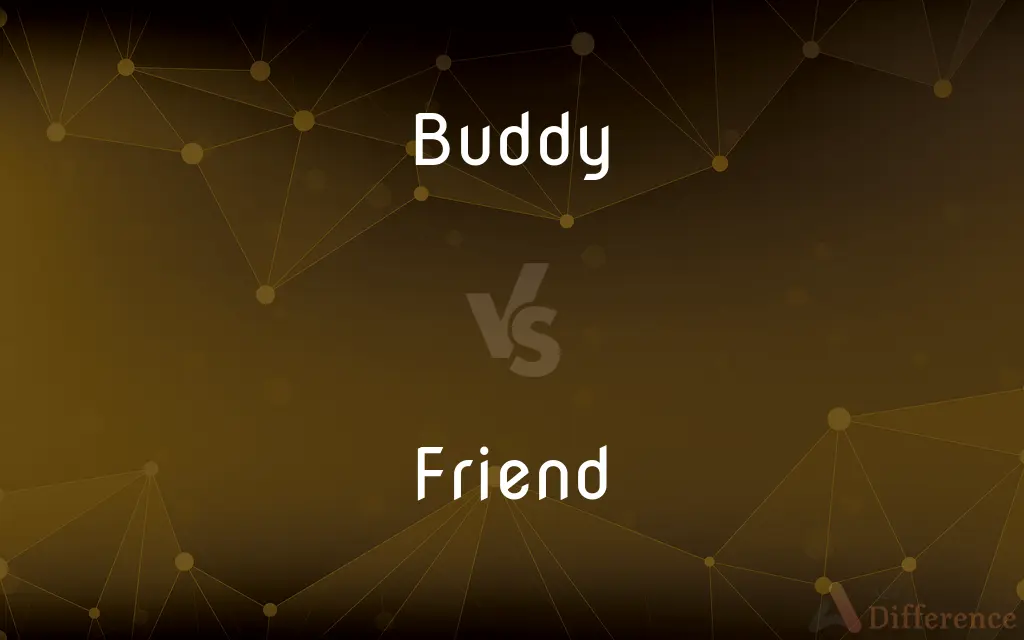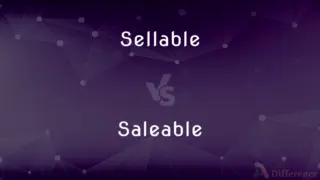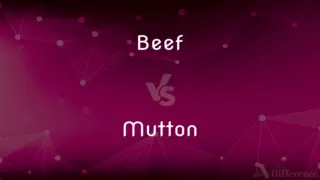Buddy vs. Friend — What's the Difference?
By Tayyaba Rehman — Updated on October 4, 2023

Difference Between Buddy and Friend
Table of Contents
ADVERTISEMENT
Key Differences
Buddy is commonly used to denote a person with whom one shares casual and friendly relations. It may not necessarily imply a deep emotional connection but rather a companionship in specific contexts or activities. On the other hand, a Friend often signifies a person with whom one has a bond of mutual affection, typically exclusive of sexual or family relations.
When referring to a Buddy, the connotation might lean towards shared activities, hobbies, or interests, such as a "gym buddy" or "study buddy." Conversely, the term Friend typically infers a connection that encompasses a broader range of shared experiences, emotional support, and often a longer or more substantial history together.
In certain contexts, Buddy can be used as an informal, colloquial term to address an individual, even if there isn't a close relationship. Alternatively, calling someone a Friend generally implies a certain degree of genuine affection and understanding, even in formal contexts.
The term Buddy might be utilized more among males and in certain cultural contexts, implying a slightly gendered or culturally specific aspect. Friend, however, is universally understood and applied across genders, ages, and cultures, signifying a broadly accepted relationship term.
Utilization of Buddy may also find place in specific scenarios, such as work, sports, or other particular environments, where personal life might not be deeply entwined. Friend, nonetheless, is often applied in a multitude of scenarios, from personal life to work, signifying a versatile term indicating emotional and psychological association.
ADVERTISEMENT
Comparison Chart
CEmotional Depth
Often lacks deep emotional connection
Typically implies emotional bond and support
Usage Context
Can be used in specific or activity-based ties
Used in various contexts, more universal
Formality
More informal and casual
Can be both formal and informal
Duration/History
May not imply a long-term relationship
Often implies a long-standing relationship
Cultural Connotations
Sometimes gendered or culture-specific
Widely used across cultures and genders
Compare with Definitions
Buddy
A partner, especially one of a pair or team associated under particular circumstances.
We became science lab buddies during the school project.
Friend
A person who provides assistance.
He has always been a friend in times of need.
Buddy
A helpful associate.
I found a study buddy in the library who helped me with the research.
Friend
A person whom one knows and has a bond of mutual affection with.
Lisa has been my friend since high school.
Buddy
A good friend; a comrade.
Friend
A person with whom one has online connections.
We have been online friends for years.
Buddy
A partner, especially one of a pair or team associated under the buddy system.
Friend
A person whom one knows, likes, and trusts.
Buddy
Friend or comrade; chum. Used as a form of familiar address, especially for a man or boy
Watch it, buddy.
Friend
A person whom one knows; an acquaintance.
Buddy
To associate as a buddy or buddies
Buddied around with the older guys.
Friend
A person with whom one is allied in a struggle or cause; a comrade.
Buddy
A friend or casual acquaintance.
They have been buddies since they were in school.
Friend
One who supports, sympathizes with, or patronizes a group, cause, or movement
Friends of the clean air movement.
Buddy
A partner for a particular activity.
Drinking buddies
Friend
Friend A member of the Society of Friends; a Quaker.
Buddy
An informal and friendly address to a stranger; a friendly (or occasionally antagonistic) placeholder name for a person one does not know.
Hey, buddy, I think you dropped this.
Friend
(Informal) To add (someone) as a friend on a social networking website.
Buddy
(In Maritime English) A person far removed from the conversation.
I found some earphones in the pocket, buddy must have been pissed.
Buddy's loaded. 'Got like three houses.
Friend
(Archaic) To befriend.
Buddy
(transitive) To assign a buddy, or partner, to.
Friend
A person, typically someone other than a family member, spouse or lover, whose company one enjoys and towards whom one feels affection.
John and I have been friends ever since we were roommates at college.
Trust is important between friends.
I used to find it hard to make friends when I was shy.
We became friends in the war and remain friends to this day.
We were friends with some girls from the other school and stayed friends with them.
Buddy
Resembling a bud.
Friend
An associate who provides assistance.
The Automobile Association is every motorist's friend.
The police is every law-abiding citizen's friend.
Buddy
A close friend who accompanies his buddies in their activities
Friend
A person with whom one is vaguely or indirectly acquainted.
A friend of a friend;
I added him as a friend on Facebook, but I hardly know
Buddy
A person with whom one shares casual activities or hobbies.
Mike is my golfing buddy; we meet up on weekends.
Friend
A person who backs or supports something.
I’m not a friend of cheap wine.
Buddy
An informal term of address, often towards males.
Hey buddy, could you pass me the wrench?
Friend
(informal) An object or idea that can be used for good.
Fruit is your friend.
Buddy
A friend, typically one of the same sex.
Back in college, Jake was my best buddy.
Friend
Used as a form of address when warning someone.
You’d better watch it, friend.
Friend
(object-oriented programming) A function or class granted special access to the private and protected members of another class.
Friend
(climbing) A spring-loaded camming device.
Friend
(euphemistic) A lover; a boyfriend or girlfriend.
Friend
A relative, a relation by blood or marriage.
Friends agree best at a distance.
Make friends of framet folk.
Friend
To act as a friend to, to befriend; to be friendly to, to help.
Friend
(transitive) To add (a person) to a list of friends on a social networking site; to officially designate (someone) as a friend.
Friend
One who entertains for another such sentiments of esteem, respect, and affection that he seeks his society and welfare; a wellwisher; an intimate associate; sometimes, an attendant.
Want gives to know the flatterer from the friend.
A friend that sticketh closer than a brother.
Friend
One not inimical or hostile; one not a foe or enemy; also, one of the same nation, party, kin, etc., whose friendly feelings may be assumed. The word is some times used as a term of friendly address.
Friend, how camest thou in hither?
Friend
One who looks propitiously on a cause, an institution, a project, and the like; a favorer; a promoter; as, a friend to commerce, to poetry, to an institution.
Friend
One of a religious sect characterized by disuse of outward rites and an ordained ministry, by simplicity of dress and speech, and esp. by opposition to war and a desire to live at peace with all men. They are popularly called Quakers.
America was first visited by Friends in 1656.
Friend
A paramour of either sex.
Friend
To act as the friend of; to favor; to countenance; to befriend.
Fortune friends the bold.
Friend
A person you know well and regard with affection and trust;
He was my best friend at the university
Friend
An associate who provides assistance;
He's a good ally in fight
They were friends of the workers
Friend
A person with whom you are acquainted;
I have trouble remembering the names of all my acquaintances
We are friends of the family
Friend
A person who backs a politician or a team etc.;
All their supporters came out for the game
They are friends of the library
Friend
A member of the Religious Society of Friends founded by George Fox (the Friends have never called themselves Quakers)
Friend
A person who is not an enemy or who is on the same side.
Let’s be friends and not fight anymore.
Friend
A member of the Religious Society of Friends; a Quaker.
The Friends' meeting house was built in the 1700s.
Common Curiosities
Can "friend" be used in a formal context?
Yes, "friend" can be used in both formal and informal contexts due to its broad application and understanding.
Is it formal to call someone "buddy"?
"Buddy" is generally considered informal and is often used in casual or friendly contexts.
Is a "buddy" a close companion?
Not necessarily. While a "buddy" can be a close companion, the term doesn't always imply a deep or emotional connection.
Is "buddy" gender-specific?
Traditionally, "buddy" is more commonly used for males, but it can be used for any gender, especially in modern contexts.
Can "friend" imply a long-term relationship?
Yes, "friend" can imply relationships of varying durations, including long-term connections.
How does social media affect the term "friend"?
In the context of social media, "friend" can imply a digital connection between two users, not always indicating a close, personal relationship.
Can "friend" be used to describe relationships across different ages?
Yes, "friend" can describe relationships between individuals of different ages, without implying a specific type or level of connection.
Can "buddy" be used interchangeably with "friend"?
While they can sometimes be used interchangeably, "buddy" often implies a more casual or activity-based relationship than "friend," which indicates a deeper emotional connection.
Can "buddy" refer to a partner in specific activities?
Yes, "buddy" is often used to refer to a partner in specific activities or contexts, like a "study buddy" or "gym buddy."
Can "buddy" be used to address strangers informally?
In some contexts and regions, "buddy" is used informally to address strangers or acquaintances without implying a real friendship.
Is "buddy" used in specific cultural contexts?
"Buddy" might be used more predominantly in certain cultures or regions and may carry specific connotations there.
Can a "friend" relationship have emotional support?
Typically, yes. "Friend" often implies a level of emotional support and understanding.
Can animals be referred to as "buddy"?
Yes, people often refer to animals, especially pets, as "buddy" in a friendly and affectionate manner.
What does it mean to "be a friend" to someone?
To "be a friend" generally means to have a mutual bond, providing support, understanding, and companionship to someone.
Can professional relationships be considered "friendships"?
Yes, professional relationships can evolve into friendships if mutual affection, respect, and personal bonding develop beyond professional interactions.
Share Your Discovery

Previous Comparison
Sellable vs. Saleable
Next Comparison
Beef vs. MuttonAuthor Spotlight
Written by
Tayyaba RehmanTayyaba Rehman is a distinguished writer, currently serving as a primary contributor to askdifference.com. As a researcher in semantics and etymology, Tayyaba's passion for the complexity of languages and their distinctions has found a perfect home on the platform. Tayyaba delves into the intricacies of language, distinguishing between commonly confused words and phrases, thereby providing clarity for readers worldwide.














































